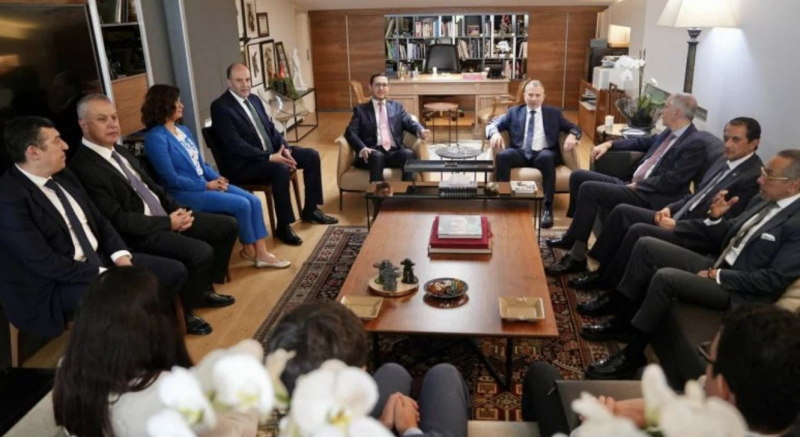
The leader of the Free Patriotic Movement, Gebran Bassil, talking to ambassadors from the quintet's member countries, in Bayada, on April 18, 2024. (Credit: Mohammad Yassine/L'Orient-Le Jour)
Despite all the efforts the quintet (USA, France, Saudi Arabia, Egypt, Qatar) put in the Lebanese dossier to ensure that the future president is the fruit of a broad agreement, Sleiman Frangieh — the Amal-Hezbollah tandem’s candidate for the presidency — insisted that he will remain in the race as long as he believes he can win.
Frangieh conveyed this message to his opponents— especially the Christians, including Free Patriotic Movement (FPM) leader Gebran Bassil — from Bkirki on Thursday, the day after he met with four of the quintet’s ambassadors — except for Saudi ambassador Waleed Bukhari.
Frangieh just thumbed his nose at the opposition, whose leading figures are calling on him to withdraw from the race, and complicated the quintet’s task.
“I am staying in the race till the end,” said the Marada leader in a statement following his meeting with the Maronite Patriarch, Bechara al-Rai. “I don’t think my candidacy will hinder the democratic process [of the presidential election]. On the contrary, it enshrines it,” he added.
Frangieh ruled out stepping away for anyone. Stressing his “good” relations with the patriarch, Frangieh was keen to point out that the head of the Maronite Church had stated to the quintet’s ambassadors that “Sleiman Frangieh is a Christian leader facing injustice.” This statement is more like a message addressed to the majority of Christian parties who oppose the Marada leader because he does not represent the community.
Reiterating his confidence in Amal-Hezbollah’s support, Frangieh revealed the content of his meeting with the four diplomats, during which the issue of Hezbollah’s weapons was raised. He explained that no presidential candidate can speak out against the state’s monopoly of carrying arms. “But, in our eyes, these are the resistance’s weapons,” he insisted, adding that this issue requires a regional agreement to be resolved.
Frangieh said that the defense strategy should be the subject of a consensus. This statement is slightly more nuanced than the one leaked to the media on Wednesday, according to which Frangieh considered it “inappropriate” to discuss a sensitive issue for Hezbollah at present.
Commenting on why Bukhari boycotted Wednesday’s meeting, Frangieh stuck to the official version that “he was absent for health reasons. He is always welcome at my place,” he said. When asked which candidate he would consider stepping down for, he said a president “whose decisions no one, not Gebran Bassil nor anyone else, can control.”
Faced with Hezbollah’s candidate’s higher tone, the diplomats continued their tour on Thursday in search of common ground and to speed up the vote. In the absence of US Ambassador to Lebanon Lisa Johnson, the other four met in Biyada with Bassil, who has been under US sanctions since November 2020.
All eyes were on Bukhari, whose presence at the meeting confirmed that his absence from Zgharta on Wednesday was not simply due to health reasons, as the Egyptian ambassador had said in a bid to justify his colleague’s absence. This reflects his objection to talks with presidential candidates. In this vein, the FPM stated that Bukhari’s presence was “a positive sign.”
“But everyone got the message,” said an FPM source on condition of anonymity. In the FPM’s eyes, the Saudi diplomat’s move pointed to a possible veto by Riyadh on the Marada leader. On the other hand, the FPM is pleased to see that the kingdom has no problem communicating with its leader, considering him key in breaking the presidential deadlock.
As for the discussions with the four diplomats, a source close to Bassil told L’Orient-Le Jour that he made it clear to his interlocutors that his party favors an agreement on the future president. Therefore, he is ready to participate in a dialogue that would have guaranteed results, whatever the form of this dialogue. The FPM therefore has no objection to holding a national dialogue chaired by Parliament Speaker Nabih Berri, with whom the FPM renewed contact several weeks ago.
According to the same source, Bassil said that if no agreement is reached on a candidate, the electoral process per the Constitution should be respected, even in the absence of prior agreement. One of the diplomats present then mentioned the lack of trust between the Lebanese actors. Bassil reportedly proposed drafting a document summarizing the commitments of all parties, to pave the way for the election.
Nevertheless, Hezbollah doesn’t seem ready to make any commitment other than Frangieh, nor will it accept any dialogue that Berri does not chair. Hezbollah’s parliamentary bloc expressed this rigid position to the French, Qatari and Egyptian ambassadors. Bukhari has severed relations with Hezbollah, and Johnson does not communicate with a party on Washington’s blacklist. But the quintet members held a meeting on Thursday to take stock of this new round of contacts. The situation is not likely to improve any time soon.
This article was originally published in L'Orient-Le Jour. Translated by Joelle El Khoury.